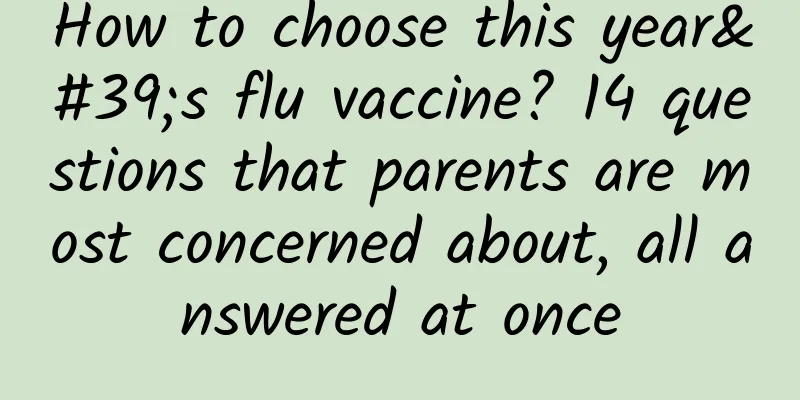How to choose this year's flu vaccine? 14 questions that parents are most concerned about, all answered at once

|
As autumn and winter arrive, the flu virus also quietly arrives. After infection, in addition to body aches, high fever, dry cough, it can even be fatal. Among the many preventive measures, flu vaccination is one of the most effective means. There are so many flu vaccines, which one is the most worth getting? When is the best time to get it? Who in the family needs it the most? This issue of "Health Focus" will explain it to you. 1. There are so many influenza vaccines available, how should you choose? 1. Inactivated Vaccine vs Live Attenuated Vaccine Influenza vaccines in mainland China are divided into two categories: inactivated vaccines and live attenuated vaccines . 1) Inactivated influenza vaccine (all injected intramuscularly) : This means that the virus has been killed and is inactive. It is very safe for most people and usually takes several weeks to produce an immune response. Inactivated vaccines are divided into "split" and "subunit" according to different production processes. Split influenza vaccine: The virus is split by chemical or physical methods, contains multiple components of the virus, has strong immunogenicity, and is more cost-effective, but may cause more obvious local reactions. Currently, most brands of inactivated influenza vaccines are "split" vaccines. Subunit influenza vaccine: The virus is further purified and only contains specific parts of the virus (such as hemagglutinin and neuraminidase). The ingredients are purer and the side effects are milder, but the immunogenicity may be relatively weak and the price is more expensive. 2) Attenuated influenza vaccine (both nasal sprays) : The virus activity is weakened, but it still has some activity. By spraying the weakened virus that cannot cause disease into the nasal cavity, the body is stimulated to produce immunity. The immune response is fast, and protection is usually obtained within a few days after vaccination. 2. Trivalent VS quadrivalent, which one should I choose? The trivalent influenza vaccine covers two influenza A virus strains and one influenza B virus strain. The quadrivalent influenza vaccine covers an additional influenza B virus strain on top of the trivalent vaccine. Normally, the quadrivalent flu vaccine provides broader protection, but what's different this year is that the trivalent vaccine is enough. This is because the B/Yamagata influenza virus strain (the additional strain in the quadrivalent vaccine) has almost not been detected since March 2020. Therefore, the WHO stated that the trivalent vaccine is sufficient to provide the necessary protection in the 2024-2025 influenza season. In other words, it is better to get the trivalent vaccine this year, which is cheaper and more economical. Of course, if you want better protection, or the local community only provides quadrivalent vaccines, you can also choose quadrivalent. 3. Domestic VS imported, which one should I choose? In the past, people often discussed whether to get domestic vaccines or imported vaccines. But this year, there is a special situation that it may be more difficult to get imported vaccines. Sanofi (one of the world's largest influenza vaccine suppliers) recently announced that it will temporarily stop the supply and sales of its Pasteur influenza vaccine in China. The specific reason is that it has observed that the potency of some influenza vaccines has decreased, so it has suspended its use as a precaution. For those who have already received the vaccine, there is no need to worry. A drop in potency does not mean it is "useless" or "unsafe". It can still provide protection, and there is no need to get another brand of flu vaccine. For those who need a second dose of the vaccine this year, they can consider sequentially getting other manufacturers' flu vaccines in accordance with the WHO's vaccination recommendations. Without imported vaccines, domestic influenza vaccines will become the main force this year. According to the "Technical Guidelines for Influenza Vaccination in China", people who can be vaccinated with different types of vaccines from different manufacturers can "voluntarily receive any influenza vaccine without priority recommendation" . Therefore, as long as the vaccine is made with the same process, there is no essential difference between brands. But if you have to summarize some suitable groups of people, you can refer to the following table: In short, there is no need to worry too much about which brand or type of vaccine to get. The most important thing is to "get vaccinated when there is a vaccine, and get it for the whole family," rather than choosing, hesitating, and waiting. 2. When is the best time to get the flu vaccine this year? 1) Why is it necessary to get a flu shot every year? Influenza viruses change every year and are prone to new variants. Every year, the World Health Organization determines the virus strains that may be prevalent in the following year based on global monitoring results, and provides targeted guidance for the preparation of influenza vaccines. In other words, the influenza vaccine may be different every year. In addition, the immunity generated by influenza vaccination will gradually weaken over time. The latest vaccine can provide the most effective protection, so it is recommended to get the influenza vaccine every year. 2) When is the best time to get a flu shot this year? Generally speaking, as long as the local flu vaccine is available, you can complete the vaccination. The best time to get the flu vaccine is 1-2 months before the peak of the flu season. It is usually recommended to complete the vaccination between September and the end of October each year. To put it bluntly, it is now . For students , they can be vaccinated at the end of August or before school starts in September to gain protection in advance. Pregnant women can receive the influenza vaccine at any stage of pregnancy, and it is recommended to receive it as soon as this year's influenza vaccine becomes available. 3) What should I do if I missed the vaccination before the end of October? If you get the flu vaccine before the end of October, you will get the best protection. If you don't get it before the end of October, don't worry, as immunization services will be available throughout the epidemic season. 4) How long will the protection from the flu vaccine last? The effectiveness of each flu shot lasts about one year. Protective antibodies are produced 2-4 weeks after the flu shot, and the antibody titer begins to decline after 6-8 months, and the immune effect basically disappears after one year. Therefore, getting a flu shot before the end of October can prevent both this winter's flu virus and the spring flu virus, and the protective effect gradually weakens in the summer. 5) If I get the flu vaccine, does that mean I will be 100% protected from infection? According to statistics, on average, the flu vaccine can only prevent about 50% of the flu, and in some years it can be higher, up to 70-80%, and in some years it can be lower. However, the flu vaccine can reduce the risk of severe illness, such as influenza pneumonia, which has a mortality rate of up to 10%, so it is strongly recommended that the elderly and children get the flu vaccine. 3. Who in the family needs to get the flu vaccine? 1 ) Who should get the flu vaccine? People aged ≥6 months who have no contraindications should receive influenza vaccination. In addition, China recommends that pregnant women, children aged 6 months to 5 years, the elderly aged 60 years and above, chronic disease patients and other high-risk groups and medical personnel be given priority for vaccination. In addition, caregivers, caregivers under 6 months old and their family members, teachers and students, people living in crowded environments (such as dormitories, prisons), and people with compromised immune systems (such as cancer patients, organ transplant recipients, HIV/AIDS patients) should also receive influenza vaccines to obtain protection. 2 ) At what age can children start receiving flu vaccinations? Children can get the flu vaccine starting at 6 months of age. For children aged 6 months to 8 years , if this is their first time getting the flu vaccine, they usually need two doses, at least 4 weeks apart. If your child has already had the flu vaccine before, they usually only need one dose. Children 9 years and older and adults usually only need one dose of the flu vaccine. The flu vaccine is safe for children, and side effects are usually mild and may include pain, redness, swelling, or warmth at the injection site. 3 ) Can children who are allergic to eggs get the flu vaccine? The production of flu vaccines usually involves the use of eggs, as the flu virus is usually cultured in eggs. However, with the advancement of vaccine production technology, the egg protein content in modern flu vaccines is very low, usually far below the level that causes allergic reactions. At present, major authoritative medical institutions at home and abroad believe that people with egg allergies, regardless of the severity, can safely receive inactivated flu vaccines. If your child is allergic to eggs, you can get the flu vaccine under the premise of close observation for 30 minutes. 4 ) Can pregnant women get the flu vaccine? Not only is it possible, but it is also recommended for pregnant women to get vaccinated. Pregnant women getting the flu vaccine can not only protect themselves from the flu, but also pass antibodies to their unborn babies through the placenta, providing protection for the first few months after the baby is born, because babies usually cannot get the flu vaccine in the first 6 months after birth. It should be noted that before pregnant women get vaccinated, it is best to consult a doctor or obstetrician to ensure that there are no contraindications. 5 ) Can the 90-year-old person in my family get the flu vaccine? As the elderly age, their immune systems weaken and their risk of serious complications from influenza increases. Flu vaccines can help prevent influenza in the elderly and reduce the risk of hospitalization and death. Whether the elderly in your family are 70, 80, or 90 years old, they can get the flu vaccine as long as there are no contraindications. See below for specific contraindications. 6 ) In what situations should you not receive the influenza vaccine? Those who are allergic to any component of the vaccine (including excipients, formaldehyde, lytic agents and antibiotics) or have a history of severe allergic reaction to any influenza vaccination are prohibited from receiving the vaccine. Patients with acute diseases, severe chronic diseases, acute exacerbations of chronic diseases, and fever are recommended to be vaccinated after recovery or stable control of their condition; Patients who develop Guillain-Barré syndrome within 6 weeks after receiving influenza vaccination are advised to consider vaccination after evaluation by a doctor. Finally, I would like to remind everyone that you may still get the flu even if you have received the flu vaccine. Therefore, during the flu epidemic, you should still pay attention to maintaining good personal hygiene habits, including: wearing a mask, washing hands frequently, paying attention to respiratory etiquette (covering your mouth and nose with a tissue when coughing or sneezing), opening windows for ventilation, eating a balanced diet, exercising moderately, and high-risk groups should try to avoid crowded places. Take good precautions to protect your family and yourself! |
>>: Can eating chili peppers extend your life? Spicy food lovers, please take note →
Recommend
Why do mobile game companies spend so much money at ChinaJoy?
On the road from Hongqiao Airport to Pudong Inter...
Breakdancing is included in the Paris Olympics? Do you want to dance?
Speaking of breakdancing What can you think of? B...
Check out 8 basic Facebook advertising tips!
For marketers and businesses, advertising on Face...
Natural history on the tip of your tongue, taste the culture and knowledge about food
Experience the culture and knowledge about food, u...
A case tells you how experienced operators manage users!
Do you often feel that you don’t understand your ...
How to conduct data analysis in SEM promotion?
When an account accumulates a certain amount of d...
The disappearance of Android's "soul", why do people no longer like to flash their phones?
"Flashing" may not be unfamiliar to the...
Which one has better optical image stabilization? iPhone 6 Plus vs Note 4
Optical image stabilization is now common in smar...
What do astronauts do when they go out for a walk?
The recent "Feel Good" team Going out f...
A 19-year-old boy has a splitting headache and his whole body is purple! It turns out that the strange disease is related to the takeaway food he often eats
A few days ago, Xiaofeng (pseudonym), a 19-year-o...
Is Houttuynia cordata a "harmful grass" and does it contain a first-class carcinogen? The truth is...
Author: Wang Yanli, registered dietitian Reviewer...
It can grow up to 2 meters and live up to 100 years. It is not a python but a fish... Its bite is not very painful, but it is very scary.
Do you know what this fish called "river mon...
No one likes watching TV anymore? Survey proves smartphones are eating into the TV industry
On December 8, Fortune magazine reported that the...
Reviewing the winning works of the 2017 Cannes Lions Creativity Festival, I summarized 5 creative templates
If you ask me which exhibitions advertisers shoul...
Can't help eating? It's not your fault! Maybe there's something wrong with your body.
With the arrival of winter, the weather is gettin...









